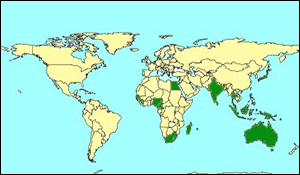
Learning From the Countries Favorable to ISIL
Question (R2 #2): In countries where polling shows favorable opinions of ISIL (Syria, Nigeria, Tunisia, Senegal and Malaysia), what does this tell us? What do these countries have in common? What is our best approach to influence/inform? Author | Editor: Steckman, L. (MITRE). The contributors to this Quick Look responded to GEN Votel’s follow-up question, […]
Continue Reading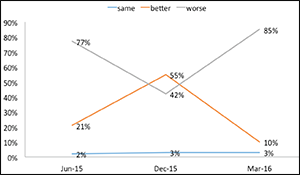
Recent IO Efforts and Sentiments
Question (R2 QL1): Have sentiments changed since the December 2014 polling? Have recent IO efforts in Mosul influenced these sentiments? What other means can we use to influence? Author | Editor: McCulloh, I. (Johns Hopkins University Applied Physics Lab). Data suggests that sentiment toward DA’ESH1 has changed since the December 2014 polling conducted by USCENTCOM. […]
Continue Reading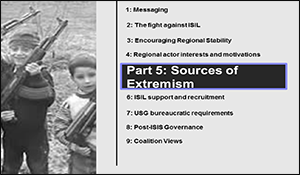
Part 5 The Various Sources of Extremism
SMA CENTCOM Reach-back Reports – Part 5: Sources of Extremism. Author | Editor: SMA Program Office. This is Part 5 of a 9 part series of SMA Reach back responses to questions posed by USCENTCOM. Each report contains responses to multiple questions grouped by theme. At the request of United States Central Command (USCENTCOM), the […]
Continue Reading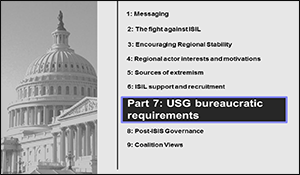
Part 7 USG Bureaucratic Requirements
SMA CENTCOM Reach-back Reports – Part 7: USG Bureaucratic Requirements. Author | Editor: SMA Program Office. This is Part 7 of a 9 part series of SMA Reach back responses to questions posed by USCENTCOM. Each report contains responses to multiple questions grouped by theme. At the request of United States Central Command (USCENTCOM), the […]
Continue Reading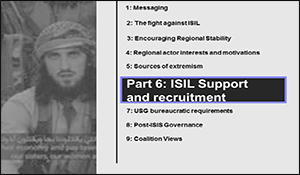
Part 6 ISIL Support and Recruitment
SMA CENTCOM Reach-back Reports – Part 6: ISIL Support and Recruitment. Author | Editor: SMA Program Office. This is Part 6 of a 9 part series of SMA Reach back responses to questions posed by USCENTCOM. Each report contains responses to multiple questions grouped by theme. At the request of United States Central Command (USCENTCOM), […]
Continue Reading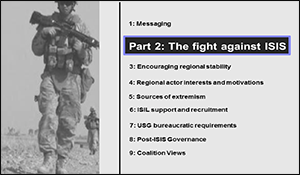
Part 2 Learning From the Fight Against ISIS
SMA CENTCOM Reach-back Reports – Part 2: The Fight Against ISIS. Author | Editor: SMA Program Office. This is Part 2 of a 9 part series of SMA Reach back responses to questions posed by USCENTCOM. Each report contains responses to multiple questions grouped by theme. At the request of United States Central Command (USCENTCOM), […]
Continue ReadingDiscourse Indicators of Gray Zone: South China Sea
Discourse Indicators of Gray Zone Activity: South China Sea Case Study. Author | Editor: Dr. Lawrence Kuznar, George Popp, & Nicole (Peterson) Omundson (NSI, Inc.) The increasing use of emotive themes and rhetorical devices (that amplify a message’s emotional effect) provide indicators of gray zone activities in speeches made by Chinese, Philippine, and Vietnamese government […]
Continue ReadingDiscourse Indicators of Gray Zone: Estonia
Discourse Indicators of Gray Zone Activity: Russian-Estonian Relations Case Study. Author | Editor: Dr. Lawrence Kuznar, George Popp, & Nicole (Peterson) Omundson (NSI, Inc.) The increasing use of emotive themes and rhetorical devices (that amplify a message’s emotional effect) provide indicators of gray zone activities in speeches made by Eurasian regional leaders and has the […]
Continue ReadingDiscourse Indicators of Gray Zone: Crimea
Discourse Indicators of Gray Zone Activity: Crimean Annexation Analysis Case Study. Author | Editor: Dr. Lawrence Kuznar, George Popp, & Nicole (Peterson) Omundson (NSI, Inc.) The increasing use of emotive themes and rhetorical devices (that amplify a message’s emotional effect) provide indicators of gray zone activities in speeches made by Eurasian regional leaders prior to […]
Continue Reading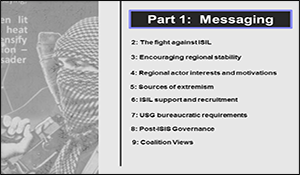
Part 1 A Compendium of Messaging Reports
SMA CENTCOM Reach-back Reports – Part 1: Messaging. Author | Editor: SMA Program Office. This is Part 1 of a 9 part series of SMA Reach back responses to questions posed by USCENTCOM. Each report contains responses to multiple questions grouped by theme. At the request of United States Central Command (USCENTCOM), the Joint Staff, […]
Continue Reading